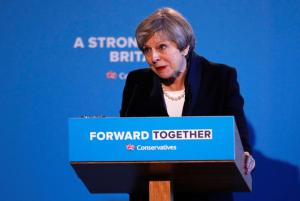
–
Social care funding and other important policy questions are too important to be decided solely by a couple of Bright Young Things and Special Advisers ensconced in Downing Street
The problem with Theresa May’s disastrous, miscalculated decision to shoehorn dramatic changes to the funding of social care into the Conservative (In Name Only) manifesto – and then perform a humiliating U-turn live on TV – is that it was cooked up by a couple of her closest, most trusted advisers and then foisted on the Conservative Party and the country with zero wider consultation.
The Guardian lifts the veil on the dysfunctional Court of Theresa May:
The manifesto for Mayism was stitched together on an upper floor of Conservative campaign headquarters over the past few weeks by a tight-knit team of the prime minister’s most trusted advisers.
While May has been out on the road giving stump speeches nearly every day, her policy team has been holed up in Matthew Parker Street in Westminster composing a document intended to redefine Conservatism, drawing a line under the elitism of the Cameron era and the individualism of Thatcher.
The document is pitched as representing May’s firmly held world view, but it also has the fingerprints of Nick Timothy and Fiona Hill, her two co-chiefs of staff, all over it.
The pair, who reigned supreme over May’s Home Office, have been the subject of complaints from MPs that they act like deputy prime ministers instead of Downing Street aides. Now the election campaign has started, they run the show at CCHQ with a tight grip.
Who needs cabinet ministers, think tanks, non-profit organisations, lobbyists, the general public or anybody else in the political ecosystem when you have two loyal SpAds ready and willing to deconstruct and rebuild core functions of the state quietly, in the shadows?
More:
MPs have complained privately over the past 10 months about the centralised nature of Downing Street, with May, Timothy and Hill sucking policy decisions away from Whitehall departments and other ministers. It comes as no surprise to them that May’s campaign focuses on her personal leadership qualities to the exclusion of other senior figures in the party, with the case for that focus bolstered by the prime minister’s strong poll ratings.
Cabinet ministers say they are not being sidelined, although the reality looks somewhat different. Of 15 campaign events for the press held by the Tories so far, all but one have been fronted by May herself, speaking of “strong and stable leadership” and the need for a mandate to carry through Brexit at every opportunity.
A few – including Boris Johnson, Michael Fallon, Amber Rudd and David Davis – have been used for some media interviews, but they are mainly kept away at constituency visits. By Wednesday, senior cabinet ministers such as Philip Hammond, Johnson and Rudd had seen the manifesto and approved its contents.
But its composition was very much a matter for May’s inner circle.
It is quite frightening to realise just how quickly harebrained, incomplete and otherwise controversial policies can find themselves shoehorned into a party manifesto (and then swiftly become law) if they are adopted and pushed by a well-connected member of the SpAd-ocracy.
In fact, prior to calling the general election the Conservatives had planned to hold at least a basic level of consultation on reforming social care, but some bright spark apparently decided that it would be far simpler to ram the changes through by including half-baked ideas as firm manifesto pledges, as the Telegraph reports:
Politicians who will deliver the Conservatives’ new care policy if they win re-election were left in the dark about their manifesto commitments, it can be revealed.
Senior Government sources have told The Sunday Telegraph they were left “completely surprised” by the wide-ranging package of reforms announced this week.
A series of social care policies were due to be put out to consultation this summer, including some of those adopted by the party in its manifesto.
However the changes would have been followed by months of consideration with less political risk if they were dropped or altered after industry feedback.
As I type, Theresa May is scrambling to defend her social care policy and her broader judgment in a television interview with Andrew Neil (the closest that the prime minister will condescend to participating in a debate) and frankly failing miserably, all of which could have been avoided if her core team behaved less arrogantly and if British political parties sought to formulate and enact legislation in a more open, inclusive way.
When President Barack Obama sought to overhaul the American healthcare system early in his first term, he didn’t slap a fully worked-out, prescriptive solution for single-payer healthcare on the table and demand that everybody get behind the main principles “or else”. While American conservatives rightly point out that the extensive consultation exercise was partly cosmetic and not nearly as welcoming of right wing input as it was portrayed, the fact remains that when American political leaders wanted to change something which impacted millions of people and a significant share of the US economy, there was a consultation (or at least the pretence of a consultation) before the first draft was issued. Sure, congressmen were expected to vote on the final bill having had only a few hours to read it, if they could even be bothered, but this was after every aspect of healthcare reform had been discussed in excruciating detail in committees, public town halls and in smoke-filled rooms with the special interests who (rightly or wrongly) have the power to make or break reforms.
This style of policymaking seems to be anathema to the British system. When David Cameron won re-election in 2015 based in no small part on the promise to hold an EU referendum, he cooked up his own list of demands for the European Union and marched off to Brussels to negotiate them (and we all know how well that worked out). Cameron and his team presumed to know – without engaging in any special consultation, public or otherwise – exactly what changes the British people wanted to see in our relationship with the EU, without once bothering to actually ask our opinion. The only thing more laughable than David Cameron deciding on our behalf what issues to raise with Brussels was the fact that they still sent him away empty-handed and humiliated. This arrogant, presumptuous approach to government was, and nearly always will be, a recipe for failure.
Few people would disagree that the way we fund social care needs to be tweaked at the very least, if not wholesale reformed. But doing so is an enormously complex process, involving the intersecting demands and interests of numerous groups and political principles. There are the interests of homeowners, taxpayers, council and private care providers, current and future care recipients, all of which will be in competition with one another and must be balanced to maintain a functional system.
But whatever one’s view on the ideal model solution, the manifesto pledge as it stands – together with recent panicked talk of a potential “cap” on care payments, made after four days of relentlessly negative headlines – seems politically naive at best. It is a blunt policy solution, a sledgehammer to crack a nut, and the kind of half-baked idea that would have been kept firmly away from the media had there been any serious ministerial input to the drafting of the Tory manifesto.
Now, there is nothing wrong in principle with having a core team of advisers and ideological kindred spirits aiding a new prime minister as she seeks to put her stamp on the party and the country. Margaret Thatcher did just that when she came to power in 1979, bearing the ideas of the Institute of Economic Affairs and the Centre for Policy Studies. As Leader of the Opposition she had read the famous “Stepping Stones” report which diagnosed Britain’s ailments and proposed radical solutions to lift Britain out of near-terminal economic decline.
But the emergency circumstances in which Thatcher pushed through her reforms were far different to today’s more benign environment. When the country faces existential threat, as we did in the late 1970s, some justification can be made for strong and decisive leadership which doesn’t wait around seeking to hand-hold and achieve consensus before acting. And while some people with a flair for the dramatic might claim that Brexit represents a similar crisis, Brexit and the rise of populism is far more a crisis of political legitimacy than economic survival – and political legitimacy is undermined, not improved, by ramming through ill-considered reforms to the social care system.
Ultimately, the cause of good policymaking is never well served when a couple of “Bright Young Thing” Special Advisers – often with wide but shallow portfolios, and no democratic mandate of their own – decide to rewrite government policy and plan to reshape our national institutions on the back of a napkin. I’m sure that Nick Timothy and Fiona Hill, Theresa May’s collective brain trust, are extraordinarily bright and capable people – on paper, at least. But the accumulation of evidence increasingly suggests that they lack street smarts, let alone a decent political radar, which is rather strange given their respective biographies. Ted Sorensen they are not.
Hopefully Theresa May will learn from this debacle. She intends to lead the country – never mind the Conservative Party – in a direction that many people have reservations about, some of them quite justified. To succeed in office, she will need to draw on the best that the entire conservative movement has to offer, including those wings of the party that she continues to vilify (cough, libertarians).
And for somebody like Theresa May, a self-confessed pragmatist with no overarching vision for government of her own, that means widening the circle and taking some more advice before tearing up the social contract, crashing out of the single market without a transitional arrangement or implementing Ed Miliband’s 2015 Labour manifesto by the back door.

–
Support Semi-Partisan Politics with a one-time or recurring donation:
–
Agree with this article? Violently disagree? Scroll down to leave a comment.
Follow Semi-Partisan Politics on Twitter, Facebook and Medium.

Yes, yes and yes again. Spads can be useful to a PM or a minister but, as you’ve shown, they can be dangerous when not controlled. As you point out, they’re not elected and so are not accountable to anyone, other than their immediate masters. We saw the emergence of Spads under Tony Blair and it is a sad fact that they see to have grown, if not in numbers, certainly in importance; seemingly indispensable. Whilst doing some good work, nevertheless, they need to be accountable in some way, if only by articles like yours. What I find hard to understand is why, when riding so high in the polls, the PM seems to have made such a mess of things. Did she feel omnipotent because of the polls, in which case, the public immediately brought her down to earth. Long live a free press!
LikeLiked by 1 person